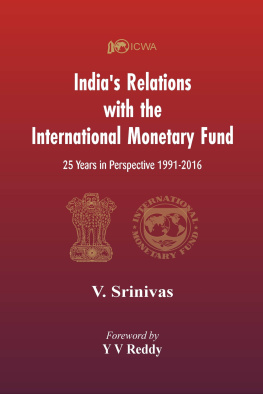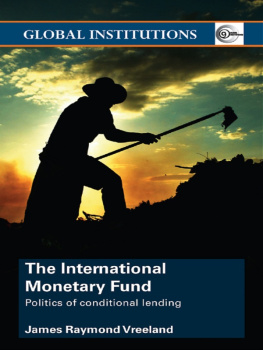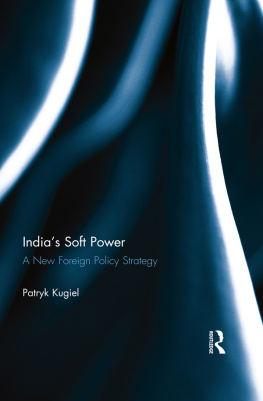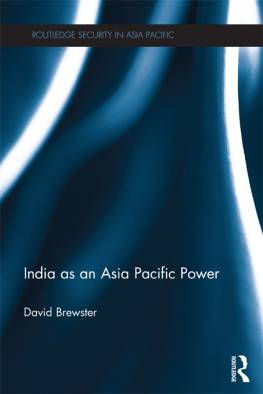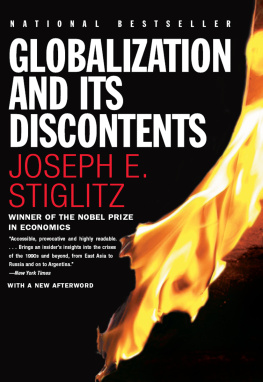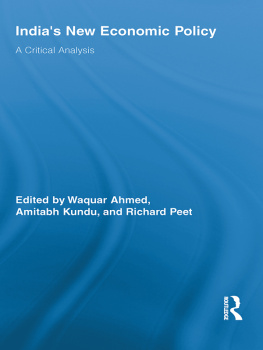Published by
Vij Books India Pvt Ltd
(Publishers, Distributors & Importers)
2/19, Ansari Road
Delhi 110 002
Phones: 91-11-43596460, 91-11-47340674
Fax: 91-11-47340674
e-mail:
web : www.vijbooks.com
Copyright 2019, Indian Council of World Affairs (ICWA)
ISBN: 978-93-88161-62-6 (Hardback)
ISBN: 978-93-88161-63-3 (ebook)
All rights reserved.
No part of this book may be reproduced, stored in a retrieval system, transmitted or
utilized in any form or by any means, electronic, mechanical, photocopying, recording
or otherwise, without the prior permission of the copyright owner. Application for such
permission should be addressed to the publisher.
The views expressed in this book are of the author in his personal capacity and do not
represent the views of the ICWA.
The word International Monetary Fund (IMF) evokes strong reaction among many people in India. It is viewed as an institution that interferes with the conduct of public policy in India. It is sometimes viewed as an institution that propagates capitalist ideology and globalisation to the benefit of advanced economies and to the detriment of developing countries like India. No doubt, there are some elements of truth in these reactions, but the reality is that India is itself an important member of the IMF, sort of one of owners contributing to its capital.
The origin of the IMF can be traced to the Breton-wood Conference convened in 1944 for purpose of formulating post-war currency system. India was invited to attend the meeting, though it was not yet independent. India, thus, became a founder member of IMF in December 1945 even before Independence. However, since Soviet Union did not join the IMF and the Peoples Republic of China was not represented in the IMF, the institution was identified with the capitalist system as distinct from the socialist block led by Soviet Union. The picture, however, changed in 1980s with the expanded membership to include them.
India is not only a founder member, but for some time it was the 5th largest shareholder. In addition, it had been the leader of the voice of developing countries a voice that has been disproportionately large relative to its voting power. In recent years, India has also emerged as an important player in the global economy and, therefore, in the functioning of the IMF.
IMF is in the nature of a club where member countries come together to observe some rules of the game relating to international monetary system. The members of the club are entitled to draw resources when needed. In some ways, IMF is a sort of lender of last resort. India has also been a beneficiary of resources from IMF in times of difficulties.
While IMF is a cooperative institution, the voting power of the members is not equal. The voting power represents broadly the importance of the country concerned in terms of share in global economic activity in trade, etc. The United States of America has effective veto power. Its governance represents unequal economic and political strengths of member countries in the world.
IMF is a creature of governments. Governments are political animals. A creature of such governments cannot but be political, to varying degrees.
The major issues relating to IMF are: a) the governance of IMF and associated ideological biases; b) its asymmetric treatment of countries in its surveillance; c) differentiated conditionality prescribed as between borrowing countries; d) its failure in recognising the contribution of borrowers; e) its incapacity to resolve sovereign debt restructuring issues; and finally f) developing a system to replace U.S. Dollar as a de facto global currency since 1970s.
There have been several controversies in regard to the IMF. Recent controversies relate to its failure in anticipating global financial crisis of 2008, its operations in Latin America, East Asia and Euro Zone. The impression has been that IMF has been somewhat soft in its conditionality in Latin America. IMF was severely criticised for the avoidable pain it imposed through conditionality in Asia. Its involvement in the Euro Zone crisis and making available resources to advanced economies with political overtones was, perhaps, the most controversial of its recent programmes. IMF is criticised for its ideological association with U.S.A. However, more recently it has demonstrated dilution of its adherence to pre-conceived ideas. This is evident from its approach to capital account management.
At one stage on run-up-to-the global financial crisis in 2008, IMF did not have enough income to pay for its up-keep. As a result of great moderation, there was no demand for resources from IMF. There was a suggestion that the world no longer needs IMF and that it could be wound up since there were no takers for its money or services. However, the dominant view was that it should continue to be supported in case the need arises. So, to get over the difficulties, gold in IMFs stock of reserves was monetised. India is one of the countries that bought the gold.
In 1991, India pledged gold to manage the crisis, and IMF gave support. By 2008, India was ready to buy IMFs gold. These should be convincing illustrations of productive partnership between IMF and India.
As it happened, IMF became a focal point for global coordination in the global economy facing prospects of serious depression in 2008, and India has been a strong supporter of multilateralism.
In all these deliberations, Indias leadership including professional inputs was conspicuous by its presence. The conclusion seems inevitable. Contrary to the popular beliefs, the partnership between India and IMF has been one of great mutual benefit.
Mr. V. Srinivas has done an excellent service by bringing on record in detail with insights, many of the interactions between India and IMF. The Book fills a serious gap in the existing literature on the subject by providing an updated analytical and objective account of India and IMF relationship. It should be of great interest to academics, policy makers and indeed general public too.
September 24, 2018
Y.V. Reddy
Chairman, 14th Finance Commission of India
Governor Reserve Bank of India (2008-2013)
The 2002 Annual Meetings witnessed unprecedented large-scale protests against the policies of the IMF and World Bank. The Anti-Globalization Protestors blocked Pennsylvania Avenue. The Washington Post dated September 27, 2002 said that anti-globalization protests were against the IMF programs in Brazil, Argentina, and IMFs maniacal support for privatization policies. Millions of protestors cried out that they were pushed into unemployment, poverty and debt by the IMF programs.
2002 was my first visit to the International Monetary Fund, as Private Secretary to Finance Minister, I was a member of the Indian delegation led by the Finance Minister to the Fund-Bank Annual Meetings. India had played several roles in the Fund, as a Founding Member and Owner; as a Borrower and then as a Creditor Nation. Indias continuous engagement with the IMF has been mutually beneficial. Some of Indias most distinguished civil servants, economists and central bankers have served as Executive Directors of India to the IMF.

